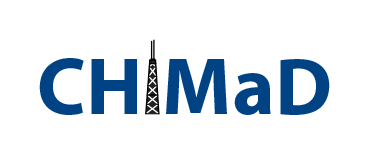Center for Hierarchical Materials Design (CHiMaD) is a NIST-sponsored center of excellence for advanced materials research focusing on developing the next generation of computational tools, databases and experimental techniques in order to enable the accelerated design of novel materials and their integration to industry, one of the primary goals of the U.S. Government's Materials Genome Initiative (MGI).
CHiMaD is a Chicago-based consortium of Northwestern University (NU), University of Chicago (UC), Argonne National Laboratory (ANL), and small-business QuesTek Innovations, along with ASM Materials Education Foundation, a professional society.
Designing novel materials of specific properties for a particular application requires simultaneously utilizing physical theory, advanced computational methods and models, materials properties databases and complex calculations. This approach stands in contrast to the traditional trial-and-error method of materials discovery. CHiMaD aims to focus this approach on the creation of novel hierarchical materials which exploit distinct structural details at various scales, from the atomic on up, to obtain enhanced properties. The center's research focuses on both organic and inorganic advanced materials in fields as diverse as self-assembled biomaterials, smart materials for self-assembled circuit designs and, advanced metal alloys.
The objectives of CHiMaD are:
- Create a collaborative environment and concentration of scientific and technical capability to accelerate materials discovery and development
- Provide opportunities to transition new breakthroughs in advanced materials to industry
- Convene multidisciplinary and multi-sector communities for in-depth discussions
- Provide training opportunities for scientists and engineers in materials metrology
- Foster the development of integrated computation, modeling and data-driven tools
- Foster the discovery of new materials Establish opportunities for extended collaborations with NIST



